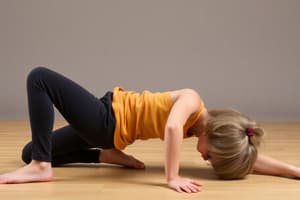Podcast
Questions and Answers
What type of information do muscle spindles detect?
What type of information do muscle spindles detect?
- Static muscle length only
- Both static length and rate of change
- Only the force exerted by muscle contraction
- Rate of change in muscle length only (correct)
Which receptor is primarily responsible for detecting static pressure on the skin?
Which receptor is primarily responsible for detecting static pressure on the skin?
- Pacinian corpuscle
- Merkel cells (correct)
- Meissner’s corpuscle
- Ruffini endings
How do dynamic proprioceptors respond to changes in indentation?
How do dynamic proprioceptors respond to changes in indentation?
- They detect only static changes in indentation
- They provide continuous pressure information
- They respond rapidly to changes in indentation (correct)
- They adapt slowly after initial stimulation
Which receptors are involved in providing information about both skin texture and object identification?
Which receptors are involved in providing information about both skin texture and object identification?
Which of these statements best describes the function of Golgi tendon organs?
Which of these statements best describes the function of Golgi tendon organs?
What is the primary role of Ruffini endings in the proprioceptive system?
What is the primary role of Ruffini endings in the proprioceptive system?
What aspect of movement is primarily affected by sensory input from cutaneous receptors?
What aspect of movement is primarily affected by sensory input from cutaneous receptors?
Which of these receptors is most likely to have a rapid adaptation to continuous skin pressure?
Which of these receptors is most likely to have a rapid adaptation to continuous skin pressure?
What type of feedback do muscle spindles provide during movement?
What type of feedback do muscle spindles provide during movement?
Which of the following describes the role of cutaneous receptors in proprioception?
Which of the following describes the role of cutaneous receptors in proprioception?
Dynamic proprioception primarily relates to which aspect of muscle awareness?
Dynamic proprioception primarily relates to which aspect of muscle awareness?
How does sensory (afferent) input affect motor control?
How does sensory (afferent) input affect motor control?
Which type of proprioceptor specifically measures muscle tension?
Which type of proprioceptor specifically measures muscle tension?
What is the primary function of muscle spindles during sustained muscle contractions?
What is the primary function of muscle spindles during sustained muscle contractions?
What do joint receptors primarily inform the nervous system about?
What do joint receptors primarily inform the nervous system about?
Which receptors are sensitive to mechanical deformation in the skin and contribute to tactile feedback?
Which receptors are sensitive to mechanical deformation in the skin and contribute to tactile feedback?
What role do muscle spindles play in the motor control process?
What role do muscle spindles play in the motor control process?
What is the difference between dynamic and static proprioception?
What is the difference between dynamic and static proprioception?
How does sensory input influence movement control?
How does sensory input influence movement control?
Which of the following describes the primary action of cutaneous receptors in movement?
Which of the following describes the primary action of cutaneous receptors in movement?
What condition reflects the impairment of proprioception despite intact motor pathways?
What condition reflects the impairment of proprioception despite intact motor pathways?
What is an efference copy?
What is an efference copy?
Which type of sensory feedback is primarily associated with maintaining balance?
Which type of sensory feedback is primarily associated with maintaining balance?
What happens to motor control when sensory (afferent) receptors are compromised?
What happens to motor control when sensory (afferent) receptors are compromised?
Flashcards
Skin stimulus intensity
Skin stimulus intensity
Different receptors in the skin have varying sensitivities to the force and change of pressure on the skin.
Static pressure
Static pressure
A constant force applied to the skin.
Dynamic pressure
Dynamic pressure
A changing force applied to the skin.
Meissner's corpuscle
Meissner's corpuscle
Signup and view all the flashcards
Merkel Cells
Merkel Cells
Signup and view all the flashcards
Muscle Spindles
Muscle Spindles
Signup and view all the flashcards
Golgi Tendon Organs
Golgi Tendon Organs
Signup and view all the flashcards
Texture identification
Texture identification
Signup and view all the flashcards
Cutaneous receptors
Cutaneous receptors
Signup and view all the flashcards
Muscle spindles
Muscle spindles
Signup and view all the flashcards
Proprioception
Proprioception
Signup and view all the flashcards
Afferent neural activity
Afferent neural activity
Signup and view all the flashcards
Efferent neural activity
Efferent neural activity
Signup and view all the flashcards
Sensory poly-neuropathy
Sensory poly-neuropathy
Signup and view all the flashcards
Motor Control
Motor Control
Signup and view all the flashcards
Central Nervous System (CNS)
Central Nervous System (CNS)
Signup and view all the flashcards
Muscle Spindle
Muscle Spindle
Signup and view all the flashcards
Proprioception
Proprioception
Signup and view all the flashcards
Sensory Afferent Input
Sensory Afferent Input
Signup and view all the flashcards
Cutaneous Receptors
Cutaneous Receptors
Signup and view all the flashcards
Efference Copy
Efference Copy
Signup and view all the flashcards
Sensory Receptor Organ
Sensory Receptor Organ
Signup and view all the flashcards
Golgi Tendon Organs
Golgi Tendon Organs
Signup and view all the flashcards
Joint Receptor
Joint Receptor
Signup and view all the flashcards
Study Notes
Motor Control (MC 2) - Acquiring Information: Sensory Proprioception
- Proprioception plays a key role in coordinating, guiding/adjusting movement, and producing skilled performance.
- The experience of reality comes from sensation.
- Movement control depends on sensory afferent information and its integration with efferent neural activity.
Sensory Sources of Afferent Information
- Sensory receptors provide afferent information associated with movement.
- Cutaneous receptors (sense of touch) inform motor control.
- Muscle spindles (muscle positioning - proprioception) inform motor control.
Sensory Poly-Neuropathy
- Degeneration of large afferent fibers (e.g., receptors in muscles, Golgi tendon organs, & tactile/cutaneous receptors) inhibits afferent neural information to the CNS.
- Efferent motor pathways remain intact.
- Pain and temperature sensation is preserved.
- Stretch reflexes (e.g., knee jerk) are absent.
- Individuals struggle with tasks like grasping, writing, buttoning, or holding a cup.
- Relearning movements requires pre-planning and visual feedback.
Sensory System: Core Facts
- The sensory system has 5 common properties when stimulated:
- Modalities (vision, touch, etc.) and their receptors.
- Location (where it is on/in the body).
- Intensity (how much/many?).
- Timing (when and how long?).
- Transduction (conversion of stimulus to neural signaling for the CNS).
- These properties link stimuli to sensations in the sensory system.
Sensory System - Proprioception - Touch Modality
- Different touch receptors have unique sensitivities to various touch modalities.
- Location: Distribution and density of cutaneous receptors provide specific information about stimuli location. Receptor density affects resolving stimulus detail.
- Two-point discrimination testing measures receptor density.
- Intensity, Timing, and Transduction
- How physical stimuli correlate with psychological sensations = Psychophysics. The relation between both are measurable quantitively.
- Different receptors respond with different frequencies.
- Identification: Texture identification via rubbing skin surfaces. Fast-Adapting Type 1 (Receptor) Response in Meissner's corpuscles is crucial.
Sensory System - Proprioception - Muscle Receptors
- Muscle Spindles:
- Responsive to stretch and changes in muscle length.
- Detect the rate of change (speed) and absolute length of the muscle fiber.
- Different modalities (location, intensity, timing, transduction), although structurally similar.
- Spindles have a non-uniform distribution, with more in muscles involved in complex movements.
- Muscle spindles allow dynamic responses through sensitivity adjustment due to fusimotor drive (efferent nerves).
Motor Control - Continued
- Sensory afferent input is crucial for movement control
- Cutaneous receptors provide preparatory and feedback relating to body contact with external stimuli.
- Muscle spindles provide sensory feedback on muscle position and rate of change, aiding in adjustment of movements.
- Supplementary videos (provided as links) provide alternative learning material to assist with understanding these concepts.
Studying That Suits You
Use AI to generate personalized quizzes and flashcards to suit your learning preferences.
Related Documents
Description
Explore the vital role of proprioception in motor control and skilled performance. This quiz covers sensory sources of afferent information and the impact of sensory poly-neuropathy on movement tasks. Test your understanding of how sensory integration facilitates movement coordination.




